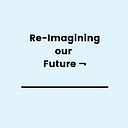Re-Imagining Partnerships
Partnership, in its purest and simplest form, is when multiple people join together for a common purpose. In the world that we live in, however, there are often unspoken power dynamics at play within a partnership. One partner may have more money than the other, or one partner may have had more education than the other partner. The partner who is thought to have more is assumed to be the final decision maker. It’s sometimes believed that one partner has more to bring or offer than the other.
But what if, when we join a partnership, we come with the understanding that everyone has something to offer? What each partner brings to the table may not be physical or easy to measure, but everyone is on equal footing with each other. Traditional and ancestral knowledge is valued as much as learning from books. Time and labor is valued as much as the money that pays for supplies. The care and nurturing work is seen just as important as the decision making and physical work.
As we re-imagine our futures, we can re-imagine the ways that we work together. No individual can survive alone. We are always in some kind of partnership with others. As we think about all of the partnerships that we find ourselves in, we can not only re-imagine what it is we bring to the table but also what everyone else has to offer as well.
In my experiences, I have found it difficult, at times, to form meaningful partnerships. Often, at the core of this difficulty, was the sense of need. I needed something from the other person. My way of viewing these partnerships was predominantly transactional. Always, during these types of interactions, I was operating based in a sense of scarcity, a sense of fear. The most vivid of these experiences was at a ‘networking event’ in Mumbai.
Perhaps the opposite of this can be described through my experience as an ordained monk, living in a forest temple in Thailand. For most of the time at the temple there were between 12 and 20 other monks. Our food was collected through alms. We each had seven pieces of clothing and a small room provided to us by the temple. We had no needs. All we had to do was be. Relationships were transformational and based on abundance. At the temple, I felt the deepest sense of ‘unconditional love’ that I had ever experienced in my life.
Understandably, a ‘networking event’ in Mumbai, and a forest temple in Thailand are examples of extremes. However, globally, most modern societies have been developed based on capitalistic values, which, on the spectrum, lie much closer to the values found in the ‘networking event’ when compared to the temple. As a result of the capitalist foundation, transactional partnerships have become the norm. The rise in online shopping is a prime example of this. You give money and you get a product without ever having to see, talk to, or get to know where the product comes from. Most of the fruits and vegetables that people in modern societies consume come from farmers that they have never met and are oftentimes from a different country.
On the contrary, when the informal economy is more robust than the formal economy, room for abundance-based partnerships naturally emerges. Community becomes a focal point. People know where the bread, vegetables, clothes, rice, et cetera come from. There is accountability, reciprocity, and relationships. Other forms of capital, besides money, become more valued. David Fleming categorized these other forms of capital as: Natural, Human, Social, Scientific/Cultural, Material, and Foundational.
As Christine mentioned in the opening paragraphs, “No individual can survive alone.” If we are going to survive the future, we must create more spaces for abundance-based partnerships.
Lead Author: Christine Bedenis
Christine is currently working at GlobeMed as the Communications and Development Manager. GlobeMed facilitates spaces for university students to grow as leaders in the health equity movement. Each university chapter participates in an anti-oppressive partnership with and learns from a groundbreaking grassroots organization in Asia, Africa, or the Americas. GlobeMed hosts a number of events focused on global health equity that are open to the community, which you can find on the program calendar. The next event is Practicing Accountability: A skill for building better relationships on March 4, 2021.
Outside of work, Christine is a part of a number of partnerships. They are working with a group of fellow Global Health Corps alumni as a part of a COVID-19 response collective action coalition to create a text bot to connect people in need to social service organizations. Christine is also an organizer with Detroit Will Breathe, an organization that formed as a part of the response to the murder of George Floyd, Breonna Taylor, and Armaud Arbery and is focused on ending police brutality.
Anchor Author: Daniel Rudolph
Currently Dan, and a small team from the Ecoversities Alliance is organizing a virtual conference, Re-Imagining Education Conference, which will be held from March 4–7. During the conference we will hear from many of the people, within, and beyond, the mainstream institutions of higher education, that are leading, enabling and experimenting with the spirit of abundance.
In addition, Dan, and a small team, are in the process of publishing a series of articles titled ‘Live Human Signposts’ that showcases individuals that have taken alternative paths to higher education and/or are pursuing regenerative livelihoods, which is being commissioned by the Ecoversities Alliance. In March, Dan will begin an apprenticeship in Vermont at the MAPLE Monastic Academy.
